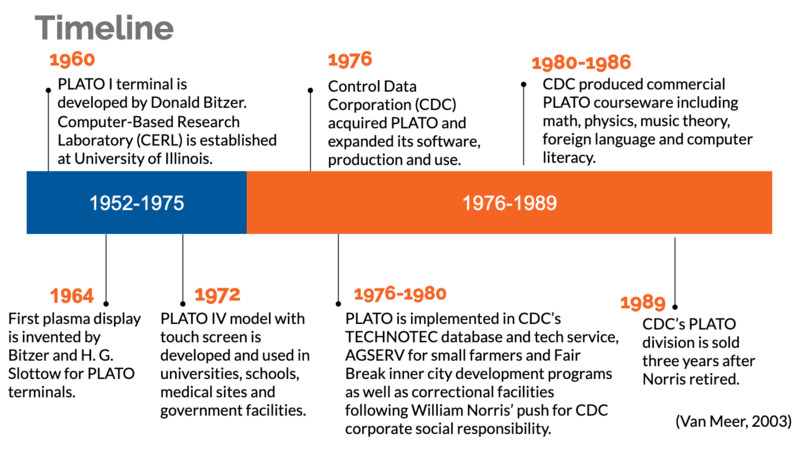Welcome to the Citizens of PLATO Digital Archive. This project is dedicated to the computing communities of the PLATO computer system, the first computer-based educational system which revolutionized information technology and cyberculture. While PLATO was a computer system developed in the 1960s for education, some important technological innovations of PLATO also include the plasma display, touch screen, graphical user interface, message boards, chat rooms, instant messaging, and real time multi-player computer games. Keep reading below for a brief historical introduction to the PLATO system and the communities that used and developed it. For more information about this digital archival project visit our About page and browse our document galleries linked above and in the control panel. For further research, please visit our Additional Resources page.
__________
PLATO (Programmed Logic for Automatic Teaching Operations) was an educational computer system developed at the University of Illinois, with the PLATO I terminal created by a Donald Bitzer led team in 1960. Riding on the heels of Cold War government funding following the National Defense Education Act of 1958, the year after Sputnik which also saw the creation of NASA and DARPA (then ARPA), PLATO was one of the many learning machine projects spurred by a U.S. drive for science and math education. In 1964, the first plasma display was invented by Bitzer and H.G. Slottow for use in PLATO terminals. Further iterations and programs were created and tested throughout the 1960s, with the Computer-Based Research Laboratory (CERL) established as its own center by 1966 instead of research continuing to operate under the previously classified military run Coordinated Science Laboratory.
The late 1960s saw computer-based education reach for the first time a diverse range of disciplines with professors and students from various University of Illinois departments becoming PLATO 'authors': course developers or program creators. A PLATO program for maternity nursing lessons developed by Maryann Bitzer was used at Mercy Hospital School of Nursing in Urbana starting in 1963. Although computers would not be used for the actual cataloging system itself until decades later, as early as 1967 Library Science instructors were experimenting with using the PLATO system for teaching libray and cataloging instruction. By the early 70s PLATO was even implemented in community engagement, perhaps the first example of online political participation or advocacy, through Valarie Lamont's Boneyard Creek PLATO program, an interactive environmental activism experiment to push for citizen participation in shaping local public policy.
CERL research marked new heights in 1972 with the development of the PLATO IV model replete with a touch screen and extensive courseware, which was being used in universities, schools, medical sites and government facilities. In the early and mid 1970s, networked games developed for PLATO with multilpayer capabilities and real-time simulations began to take off on the system both disparate from and often in conjunction with educational courseware. This networked gaming along with early social computing operations similar to email or instant messaging such as PLATO TERM-talk and Talkomatic and discussion boards or group forums such as PLATO notesfiles helped build robust early online communities distributed across the system. However, by the early 1970s, government funding for a computer-based educational system had become quite limited. Instead, the computer industry was beginning to become corporatized, and by 1976 PLATO was fully acquired by Control Data Corporation (CDC), a Minneapolis based mainframe and supercomputing company founded by ex-Navy World War II codebreakers Seymour Cray and William Norris.
Although Cray had left CDC duties by this time to pursue dreams of building the world's largest and fastest computer, during the late 1970s and early 80s CDC expanded PLATO software, production, development and use. At Control Data under Norris' tutelage and philosophy of 'corporate social responsibility', PLATO was implemented not just in CDC's TECHNOTEC database and tech service and AGSERV for small farmers but also in inner city development programs such as Fair Break for low income and at risk youth in the Twin Cities. The Fair Break model, which not only used PLATO for remedial education but also offered counseling and paid work to underprivileged students, was replicated by the CDC in other cities across the country including Baltimore. Norris also pushed for Control Data to put PLATO terminals in Minnesota correctional facilities, provide them to physically handicapped students through the creation of a disability outreach program called Homework, and expand factory production in metropolitan areas to offer jobs and skill building to economically disadvantaged workers.
Between 1977 to 1982 Norris gave a series of public talks on the changing relationship between technology, business and social justice called Technology: Our Tireless Servant emphasizing issues of employment, education and policy and harnessing a real belief in the PLATO system and computer-based education in general to offer transformative capabilities for social and economic systems in the U.S. Throughout the 1980s Control Data continued to produce commercial PLATO courseware including math, physics, music theory, foreign language and computer literacy as well as creating PLATO compatabilities for accessible use with Atari, Apple and Texas Instruments microcomputers. However, Control Data was unable to compete in the personal computing market, and the CDC PLATO division was sold in 1989 three years after Norris retired.
Browse through the PLATO in Use and Development: Photo Gallery for images of PLATO users and communities between the creation of the PLATO I terminal in 1960 and Norris' retirement in 1986. You can find original documents on PLATO's development, implementation and surrounding research programs in PLATO Reports and Research. Lastly, for a look at the PLATO corporate image from Control Data, check the Promotional Materials page.
